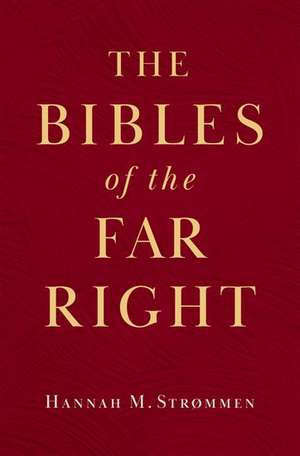The Bibles of the Far Right
Autor Hannah M. Strømmenen Limba Engleză Hardback – 18 dec 2024
Preț: 158.50 lei
Preț vechi: 179.73 lei
-12% Nou
Puncte Express: 238
Preț estimativ în valută:
30.33€ • 32.43$ • 25.29£
30.33€ • 32.43$ • 25.29£
Carte disponibilă
Livrare economică 17-22 martie
Preluare comenzi: 021 569.72.76
Specificații
ISBN-13: 9780197789896
ISBN-10: 0197789897
Pagini: 344
Dimensiuni: 152 x 226 x 33 mm
Greutate: 0.61 kg
Editura: Oxford University Press
Colecția OUP USA
Locul publicării:New York, United States
ISBN-10: 0197789897
Pagini: 344
Dimensiuni: 152 x 226 x 33 mm
Greutate: 0.61 kg
Editura: Oxford University Press
Colecția OUP USA
Locul publicării:New York, United States
Recenzii
Strømmen's innovative and compelling work draws on Deleuze and Guattari's theory of assemblages to construct a fresh mode of biblical scholarship that points a way forward for the field. Theoretically sophisticated yet accessibly articulated, this work challenges biblical scholars to confront the real world effects of biblical assemblages and experiment collaboratively with possibilities for change. Creative, exciting, and ultimately transformative, Strømmen's study paves the way for a new field of biblical studies that is both ethically engaged and politically relevant.
Strømmen is an important voice not only in the study of contemporary political uses of the Bible but of reception history of the Bible more generally. The Bibles of the Far Right will, of course, be an indisputably crucial resource in both respects. But its sharp, authoritative analyses of wide-ranging uses of the Bible in some of the most controversial areas of contemporary political discourses is an exemplary model for how biblical studies can influence research in the humanities and social sciences. For biblical studies, The Bibles of the Far Right is a landmark publication of its generation.
Who gets to lay claim to Christianity and its scripture in Europe? Drawing on sources across disciplines, Strømmen scrambles the secular-religious divide to show how bibles as 'lived scripture' are used with other objects to produce social and political effects and affects. She develops the concept of a 'biblical assemblage' to argue that there is nothing inevitable about the European far right's efforts to justify violence and exclude Muslims and others in the name of Christianity. An ambitious, important book that tackles head-on the most daunting contemporary challenges involving the interplay of religion and politics.
Strømmen is an important voice not only in the study of contemporary political uses of the Bible but of reception history of the Bible more generally. The Bibles of the Far Right will, of course, be an indisputably crucial resource in both respects. But its sharp, authoritative analyses of wide-ranging uses of the Bible in some of the most controversial areas of contemporary political discourses is an exemplary model for how biblical studies can influence research in the humanities and social sciences. For biblical studies, The Bibles of the Far Right is a landmark publication of its generation.
Who gets to lay claim to Christianity and its scripture in Europe? Drawing on sources across disciplines, Strømmen scrambles the secular-religious divide to show how bibles as 'lived scripture' are used with other objects to produce social and political effects and affects. She develops the concept of a 'biblical assemblage' to argue that there is nothing inevitable about the European far right's efforts to justify violence and exclude Muslims and others in the name of Christianity. An ambitious, important book that tackles head-on the most daunting contemporary challenges involving the interplay of religion and politics.
Notă biografică
Hannah M. Strømmen is a biblical scholar specializing in the reception of the Bible in contemporary culture and politics. She is Senior Lecturer in Bible, Politics, and Culture at Lund University, and currently holds a Wallenberg Academy Fellowship. She has written widely on the impact of the Bible in literature, philosophy, and politics in the twentieth and the twenty-first centuries. Before taking up her position at Lund, she was Reader in Biblical Studies at the University of Chichester, UK. She is a Fellow of the Center of Theological Inquiry in Princeton, where she participated in the interdisciplinary inquiry on religion and violence.
